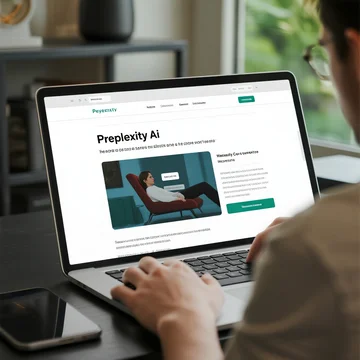Curious about the Perplexity AI search engine and how it stands against Google? This guide breaks down their differences in speed, results, and use cases. As AI-driven search becomes more relevant in 2025, Perplexity AI is emerging as a serious alternative—especially for those seeking direct, context-rich answers.

What Is the Perplexity AI Search Engine?
The Perplexity AI search engine is a conversational AI-powered tool that delivers real-time answers, not just links. Unlike traditional search engines like Google, it synthesizes content from credible sources and presents digestible summaries along with citations. Built on advanced language models (notably OpenAI’s GPT architecture), Perplexity AI is tailored for natural queries, offering users an experience that blends search with conversation.
Key Feature: Direct answers with citation links for transparency and credibility.
Tech Stack: Uses large language models (LLMs) like GPT-4-turbo for real-time search responses.
Interface: Clean, chat-style interface with context threading.
How Does Google Search Work Differently?
Google, on the other hand, operates on traditional index-based crawling. It ranks websites using over 200 signals such as keyword relevance, backlinks, page speed, and user behavior. Google's approach excels in surfacing a wide range of results across billions of pages—ideal for broad discovery but less efficient for nuanced queries.
While Google's algorithmic updates (like BERT and MUM) have improved understanding of natural language, it still typically offers a ranked list of links, requiring users to click through for answers.
Perplexity AI vs Google: Core Differences
? Response Style
Perplexity AI delivers concise answers with citations. Google presents SERPs (Search Engine Results Pages) with ads, featured snippets, and organic links.
?? AI Integration
Perplexity AI is fully AI-native. Google Search integrates AI elements, but is fundamentally link-oriented and ad-driven.
Citation and Transparency
One standout feature of the Perplexity AI search engine is its insistence on citing all sources. This adds a layer of trust, especially useful for students, journalists, and researchers who need verifiable information. Google’s snippets rarely show full citations unless the user clicks through.
Use Cases: When to Use Perplexity AI Over Google
?? Academic research with verified sources
?? Quick explanations or summaries of complex topics
?? Exploring unfamiliar topics in natural language
?? Avoiding SEO-optimized but unhelpful pages
Real-World Performance Test
When asked “How does quantum computing impact AI?”, Perplexity delivered a 4-paragraph summary with citations in under 5 seconds. Google, however, returned articles with varying relevance, requiring manual comparison and reading. For those seeking fast comprehension, Perplexity AI proved more efficient.
Pros and Cons: Perplexity AI Search Engine
Pros
? No ads or distractions
? Transparent, citation-based answers
? Conversational and follow-up friendly
? Real-time web access for fresh content
Cons
? Limited multimedia results (images/videos)
? Lacks granular filtering (e.g., by region/date)
? Still growing—smaller data index than Google
SEO and Monetization Differences
Google Search is a monetized platform heavily reliant on ad revenue. That affects its search result layouts and may influence ranking factors. In contrast, the Perplexity AI search engine currently does not display ads, making the user experience cleaner but possibly subject to future monetization strategies like premium plans or API limits.
Developer and API Access
Perplexity AI also provides API access for developers and businesses aiming to embed its search capabilities into their workflows or platforms. It appeals to SaaS tools, academic platforms, and AI content services needing reliable, sourced output. Google’s Search API is available but much more complex and costly.
Who Is Perplexity AI Best For?
The Perplexity AI search engine is ideal for students, professionals, researchers, and casual users looking for direct, referenced answers. It saves time and avoids SEO traps. However, if your goal is to explore image galleries, discover local businesses, or do deep shopping comparisons, Google is still the better choice.
Final Verdict: Can Perplexity Replace Google?
Not entirely—at least not yet. Google is still superior for breadth, local searches, and commercial discovery. However, Perplexity AI search engine excels in precision, citations, and usability. As AI search continues to evolve, Perplexity is likely to grow as a niche tool for those needing fast, reliable knowledge without the clutter.
Key Takeaways
? Perplexity AI provides fast, cited, conversational answers.
? Google remains superior for broad discovery and local needs.
? Perplexity is ad-free and focused on user intent.
? Ideal for education, quick research, and AI-assisted queries.
Learn more about Perplexity AI
